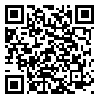Volume 48, Issue 4 (2-2025)
Research in Medicine 2025, 48(4): 39-47 |
Back to browse issues page
Ethics code: IR.IAU.VARAMIN.REC.1400.057
Download citation:
BibTeX | RIS | EndNote | Medlars | ProCite | Reference Manager | RefWorks
Send citation to:



BibTeX | RIS | EndNote | Medlars | ProCite | Reference Manager | RefWorks
Send citation to:
Gholizadeh F, Baghbani-Arani F. Study of Anti- Apoptotic Effects of UIO-66-NH2 Nanoparticles Containing Letrozole on MCF-7 Breast Cancer Cell Line. Research in Medicine 2025; 48 (4) :39-47
URL: http://pejouhesh.sbmu.ac.ir/article-1-3390-en.html
URL: http://pejouhesh.sbmu.ac.ir/article-1-3390-en.html
Department of Genetics and Biotechnology, School of Biological Science, Varamin- Pishva Branch, Islamic Azad University, Varamin, Iran. , baqhbani.f@gmail.com
Abstract: (1663 Views)
Background and Aim: Metal- organic frameworks (MOFs) are groups of hybrid porous materials are constantly being developed due to their porous nature and very high and specific crystalline surfaces for various applications, especially the release of drugs according to specific design. In this research, the anti- apoptotic effect of UIO-66-NH2 nanoparticles containing letrozole on breast cancer cells was investigated.
Methods: In this experimental study, after preparing the nano- drug, the structure and morphology of these particles were investigated by FE-SEM method. Then, the toxic effects of the nano- drug were evaluated on the MCF7 cell line by MTT assay. Finally, the expression of Casp3 and Casp9 genes was analyzed by real- time PCR method. GraphPad Prism version 7.01 software was used for statistical calculations. Owing to the regularity of the data distribution, One- Way ANOVA was utilized to compare the treatment and control groups, and p < 0.05 was considered a significant difference.
Results: The results showed that the nanoparticles have a polyhedral shape. Also, the UIO-66-NH2-Let component has toxic effects on MCF7 breast cancer cells by a dose- depended manner with the IC50 value of the 1.26 ± 57.71 μg/mL. Also, UIO-66-NH2 nanoparticles containing letrozole at the IC50 concentration were able to significantly increase the expression of the apoptotic genes Casp3 and Casp9 by 4.35 ± 0.62 and 4.70 ± 0.92 times, respectively, compared to the control group (P < 0.001).
Conclusion: It seems that the UIO-66-NH2-letrozole has toxic effects on MCF-7 breast cancer. Therefore, it seems useful to use it in studies related to cancer treatment in the future.
Methods: In this experimental study, after preparing the nano- drug, the structure and morphology of these particles were investigated by FE-SEM method. Then, the toxic effects of the nano- drug were evaluated on the MCF7 cell line by MTT assay. Finally, the expression of Casp3 and Casp9 genes was analyzed by real- time PCR method. GraphPad Prism version 7.01 software was used for statistical calculations. Owing to the regularity of the data distribution, One- Way ANOVA was utilized to compare the treatment and control groups, and p < 0.05 was considered a significant difference.
Results: The results showed that the nanoparticles have a polyhedral shape. Also, the UIO-66-NH2-Let component has toxic effects on MCF7 breast cancer cells by a dose- depended manner with the IC50 value of the 1.26 ± 57.71 μg/mL. Also, UIO-66-NH2 nanoparticles containing letrozole at the IC50 concentration were able to significantly increase the expression of the apoptotic genes Casp3 and Casp9 by 4.35 ± 0.62 and 4.70 ± 0.92 times, respectively, compared to the control group (P < 0.001).
Conclusion: It seems that the UIO-66-NH2-letrozole has toxic effects on MCF-7 breast cancer. Therefore, it seems useful to use it in studies related to cancer treatment in the future.
Type of Study: Original |
Subject:
Cellular Sciences (Molecular Cells, Stem Cells)
Received: 2024/06/18 | Accepted: 2025/01/22 | Published: 2025/03/11
Received: 2024/06/18 | Accepted: 2025/01/22 | Published: 2025/03/11
Send email to the article author
| Rights and permissions | |
 |
This work is licensed under a Creative Commons Attribution-NonCommercial 4.0 International License. |






